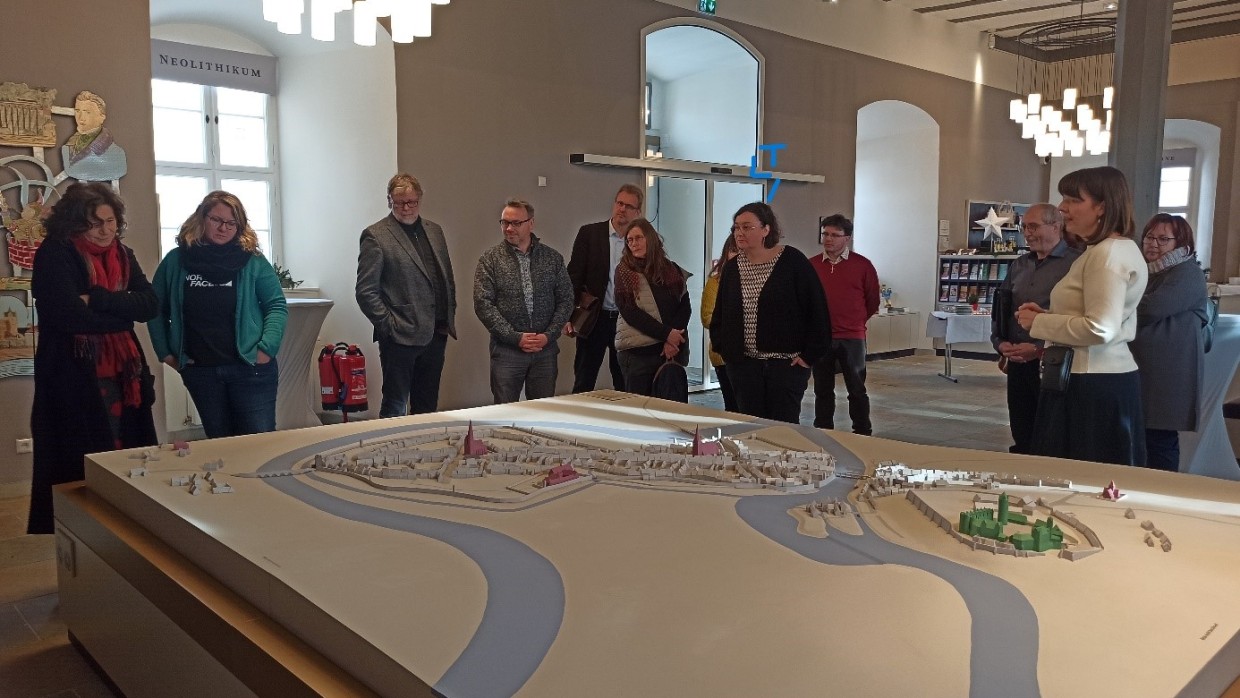News
News
With an invitation to listen - the Museumsverband Sachsen-Anhalt e.V.
Emergency preparedness, sustainability, accessibility and the search for new talent - the Museumsverband Sachsen-Anhalt e.V. (Saxony-Anhalt Museum Association) is also dealing with major challenges throughout the industry on a daily basis. In this interview, Luisa Töpel, Managing Director of the association, describes the current situation in the state and explains why she is so enthusiastic about working with people in the individual institutions. History and culture have deep roots in Saxony-Anhalt - not only thanks to the 5 UNESCO World Heritage Sites. How can quality assurance in museums succeed despite the increasing shortage of skilled labour?
The Museumsverband Sachsen-Anhalt e.V. has around 300 members, of which around 230 are museums, representing the vast majority of the state's museum landscape. In addition to the major world heritage sites, it is above all the medium-sized and small museums that characterize the cultural landscape in Saxony-Anhalt. They cover a wide range of topics, as the managing director of the museum association, Luisa Töpel, explains: "From archaeology and the Middle Ages to Luther and modernity - the topics are diverse. What they all have in common in my eyes, however, is that they are all backed by many committed museum people who want to contribute to ensuring the quality of museums with passion and dedication." Their association is also committed to this and acts as a lobby for its members vis-à-vis funding organizations and state politicians. Expert opinions and statements for the specialized authorities, the examination of funding applications, further training courses, workshops and networking opportunities are among the most important tasks and support services on offer. The association has also formed three working groups - Oral History, Education and Communication and eCulture - and a fourth working group on industrial museums is due to start work soon. "There are hardly any quiet days, because we have our hands full," reports Töpel, citing sustainability as an example that affects all museums. The aim is not only to raise awareness of this, but also in terms of accessibility, "we started out on our journey", says Töpel. There are already good examples, such as the Winckelmann Museum in Stendal, but the removal of barriers is often a question of financial resources. Weather-related damage is also playing an increasingly important role, such as heavy rain events and their consequences, as was recently the case at the Central and State Library in Berlin. The institutions in Saxony-Anhalt are increasingly preparing: "The conservation advice centre at the Gleimhaus. Museum of the German Enlightenment in Halberstadt is providing our members with a great deal of support in this matter. There are more and more emergency networks, and we currently have the largest one in the Harz region. The centres also have emergency kits for first aid - these include packaging material for wet objects, gloves and face masks," says Töpel.
The museum landscape in Saxony-Anhalt is also feeling the effects of social change. Democracy and diversity play a major role. For the coming year, the association is planning training programmes for museum staff to prepare them for critical situations when dealing with visitors, as Töpel explains. In Luisa Töpel's eyes, the shortage of skilled labour is also becoming increasingly apparent: "In the past, when a job in the cultural sector was advertised, we used to receive 80 applications - now it's more like 20 and there's no guarantee of finding someone suitable who will still be there in a year's time. We have to fight for good applicants." Accordingly, it is increasingly a matter of creating or deepening competences within our own ranks. The Museum Association has launched a series of qualification programmes for this purpose. "Cashiers and museum education staff, for example, are taught the basics when it comes to inventorying objects and the demand for this is huge. We are realizing how great the need is, but also the will for further training," says Töpel.
The association spends a lot of time and effort on public relations work, both to promote interest in the museum landscape in Saxony-Anhalt and to remain interesting for young talent. In addition to a regular newsletter and a presence on social media, the podcast "#museumslauschen" was launched. An idea that goes back to the pandemic period, as Töpel reports: "Everyone wanted to make their offerings available digitally during this time and podcasts sprang up like mushrooms - compared to many others, our format has held its own." Always with a different theme, museum employees report on their exhibitions and give listeners an exciting look behind the scenes. No small task, because research, writing scripts, arranging dates, recording and publishing - the association does it all itself. This also demonstrates the enthusiasm and commitment to cultural mediation that characterizes both the association and its members. New impulses are always welcome, for which MUTEC is ideally suited, and the Saxony-Anhalt Museum Association will be there with its members for the first time. Luisa Töpel is already looking forward to the conference programme, the variety of exhibitors and the opportunity to network.




